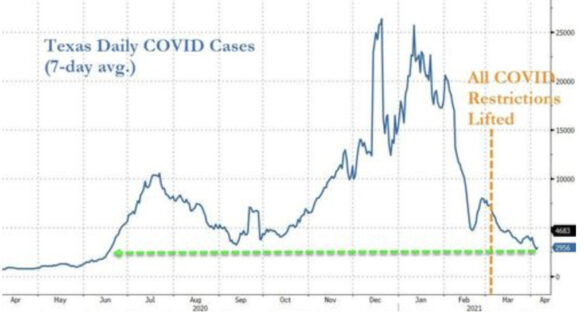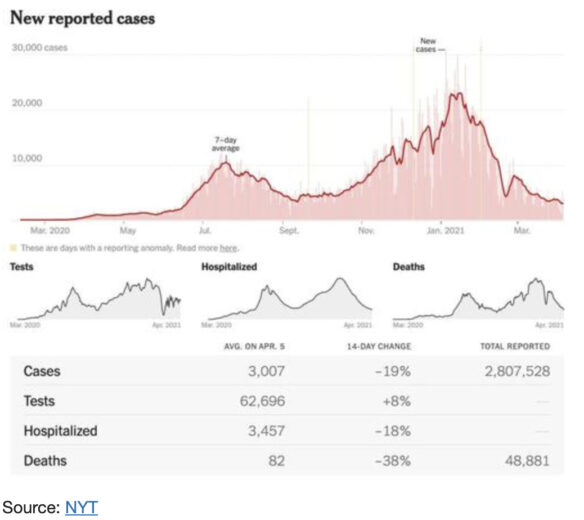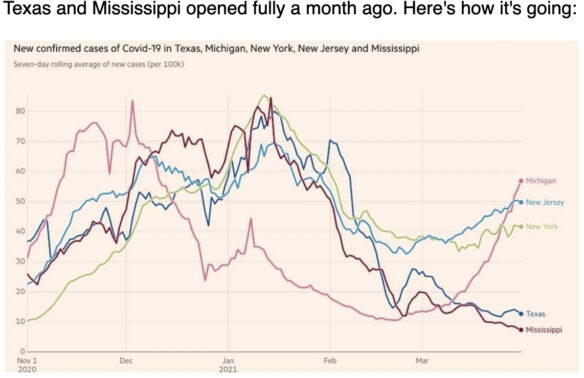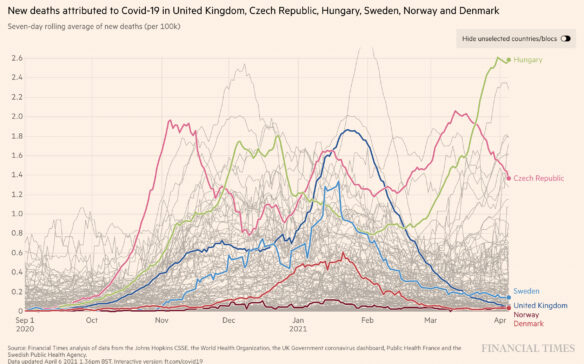Texas opened up its society nearly a month ago, ending mask mandates and other lockdown measures. This was the scene for the Texas Rangers’ opening day:

More than 40,000 people enjoying a beautiful day of baseball, with very few masks in sight.
So, everybody in Texas is going to die from the virus, right? Well, so far, definitely not.

Hospitalizations and deaths must be shooting up, right? Nope.

In fact, Texas and Mississippi, which are mostly open, are doing much better than the continually locked down states of New York, New Jersey and Michigan.

Meanwhile, there is the strange case of the country of Nicaragua (where I lived in the 1980s). The socialist government there never locked down or mandated masks and told people to stay at home or wear masks if they wanted to. No mandates. Meanwhile, all of the other countries in Central America (all of which I have visited multiple times since the 1980s) instituted mandates of one kind or another. How is that going?

Yes, you are reading that graph correctly. Nicaragua, with no lockdowns and no mask mandates, has had almost no deaths at all from COVID.
I know what you are thinking. Nicaragua is probably not reporting COVID correctly, right? Actually, as this story points out, even the government’s opposition political party count of cases shows Nicaragua was more successful than its neighbors in Central America. This story explains the strange history of Nicaragua’s success against COVID (with no lockdowns) compared to its neighbors (with lockdowns). Read the whole thing.
We end today with Sweden, which never locked down. Sweden is somewhere in the middle of European countries, better than many Eastern European countries, the UK, Spain, Belgium and Italy, but with results below Norway and Denmark.

I want to emphasize this point: the press assured us in April 2020 that Sweden would be a COVID killing field. None of the horrific predictions came true. Meanwhile, most other countries in Europe have tyrannical lockdowns that are getting more tyrannical every week. Where would you rather live, the free country where you can make your own choices and stay at home and wear a mask if you wish, or the one that will not let you travel and is constantly planning new ways to reduce your freedom?
The evidence is clear, folks: lockdowns and mandates don’t work. This has been known for decades, and this is why there were no lockdowns or mask mandates in earlier worldwide pandemics. Viruses are very unpredictable and are affected by a variety of things, but the things that don’t affect them are mask mandates and lockdowns.
Stop being fearful. The results clearly show that freedom works!


There was a study released last week that found that almost 30% of adults were grossly over estimating the effects of Covid. As in they thought if you get sick with it you were going to die. It’s so frustrating here in New Mexico. We have had daily case counts under 200 and going down for over a month, less than 90 people in the whole state hospitalized with Covid and yet we’re still locked down. My kids went back to school in person for the first time yesterday (5/5) in over a year. It’s been frustrating to me to see friends in Arizona, Utah, Idaho, Texas and even Europe sending their kids to school, and those kids doing normal things like band/orchestra, sports, drama, and mutual activities without masks to burden them. My family in Arizona reports they’ve been having regular 2 hour church meetings for a month now, without masks or social distancing and it’s been fine.
Brazil seems to be having a hard time with COVID, even though no tyrannical lockdowns were used there. So you have insights on why the numbers there seem so bad? How do their numbers compare to the U.S.?
Ji, Brazil is lead by a relatively conservative president who has rejected lockdowns on a national basis, but almost all of the Brazilian states and many cities have imposed their own lockdowns. So, there have been plenty of tyrannical lockdowns in Brazil, and in fact more than 500,000 small businesses have been closed either temporarily or permanently because of the lockdowns.
https://www.reuters.com/article/us-health-coronavirus-brazil-bankruptcy-idUSKCN24H2XR
I lived in Brazil for four years, so I can speak with some knowledge about that country.
The worst thing about the lockdowns in poorer countries like Brazil is that they have very little effect on the richest people who can continue to go to their private clubs or drive to their private beach homes. Professionals can continue to get on zoom calls. The working poor usually have very little savings, and if their jobs are gone they suffer massively, and of course fewer jobs means the poor cannot find new jobs as easily if they lose the job the have. And if you have been to Brazil you will perceive very quickly that most people are poor.
You seem to imply that my post somehow makes the point that lockdowns lead to a worse result from COVID, and that is not my point at all (although it may be the experience of some countries or US states). If you are going to force people to stay at home and if you are going to close most businesses, you should expect this to have some kind of positive result. So, if we approach this in a scientific way the hypothesis would be that lockdowns will massively decrease death and hospitalizations and cases of COVID 19. When we observe the results, we see no convincing evidence of this, with a lot of scatter-shot results where countries that don’t lock down in some cases do better than comparable countries that do lock down. So, the scientific results indicate lockdowns don’t work. And when you throw in the human suffering caused by lockdowns, the clear results are: don’t impose lockdowns.
In terms of Brazil’s overall COVID experience, Brazil’s results are comparable to the U.S. in per capita deaths, cases and hospitalizations.
Half-hearted lockdowns don’t work very well.
Australia is a country I am familiar with. Australia had serious lockdowns (relatively short (weeks), but very strict) with good results. They also sealed the borders, a critical element. As my Australian friends tell me, their cases are now in quarantine hotels, and if you are an Australian living outside of Australia, it is very difficult to be let back in with strict quarantines and all that. Australia and New Zealand have now formed a travel bubble for the two countries.
Leo, your comment is a classic case of the Texas sharpshooter fallacy, which you can read about more here:
https://blog.hubspot.com/marketing/common-logical-fallacies
If we want to prove that lockdowns work, we must see evidence that they always work. In the case of Europe, the lockdowns have been extremely harsh, as they have in many U.S. states. And, yet, I have provided extensive evidence that lockdowns do not work comparing like countries to like countries and like states to like states.
So, what you have done is taken two island nations that do not have any borders with other countries and can control who comes into their countries very easily and said, “see, the lockdowns work under those conditions — therefore lockdowns must always work!” And in the process you have decided to ignore all of the other evidence that lockdowns do not work. There is nothing scientific or even intelligent about such an approach, but unfortunately you are not the only one using this fallacy. To make this easy to understand, this is kind of like saying that you had sex twice without any protection and the woman did not get pregnant, therefore you arrived at the conclusion that you never need protection when having sex if you don’t want to get a woman pregnant. Can you see how that might be a bit problematic?
Thanks for sharing this. I wonder how Florida and South Dakota compare too?
Ken, good question. You can see the numbers here:
https://www.worldometers.info/coronavirus/country/us/
I think the best, most realistic measurement is deaths per capita, and in this case South Dakota (with no lockdowns ever) is number 9 nationwide, while of course the super-locked down states of New Jersey and New York are the worst. And when we consider Florida (no lockdowns since May 2020), we see that Florida is number 28 out of 50 states in terms of deaths per capita. One interesting point is that South Dakota (no lockdowns) and North Dakota (lockdowns) had very similar results overall.
Any honest scientist looking at the results as a science experiment would have to come to the conclusion that lockdowns, given all of the negative externalities, do not work. The hypothesis that lockdowns will save lives is simply not proven when looking at the results of the past 13 months. For those who are skeptical, I would like to point out that the way you do a science experiment is that you take a hypothesis (“lockdowns will have negative externalities like people losing their jobs, and kids not going to school, but they will be worth it because they will always save lives.”). And then you test it. And when you test it you see the obvious results that this hypothesis is false and should be abandoned. It does not matter if lockdowns work in a few locations — lockdowns must always work for the hypothesis to be proven not false.
I agree with you. I would go further to say the lockdowns have been disastrous when you look at the human costs that have attended them, (some of which you outlined in your essay.) It reminds me of the saying that the road to hell is paved with good intentions. That’s the most generous thing I can say about the lockdowns. My “fear” is for the ramifications of the multi-generational repercussions of these actions. I grieve that some of the lockdowns are politically rather than scientifically motivated, but that’s a topic for another discussion. Thank you again for the essay. I did note the two links regarding Nicaragua point to the same article. Is that what you intended?
Ken, I completely agree. I wrote about this a few months back. I don’t know if you read this post, but if not:
https://www.millennialstar.org/we-should-be-speaking-out-against-deadly-authoritarian-lockdowns/
Thanks for the comment on the double link. I fixed it.